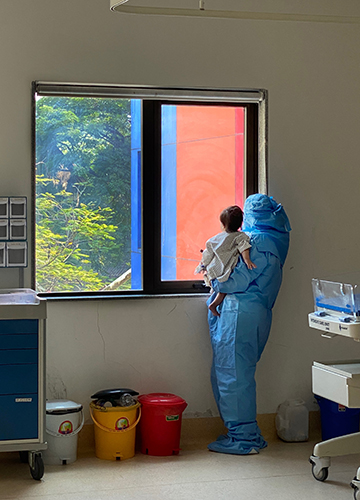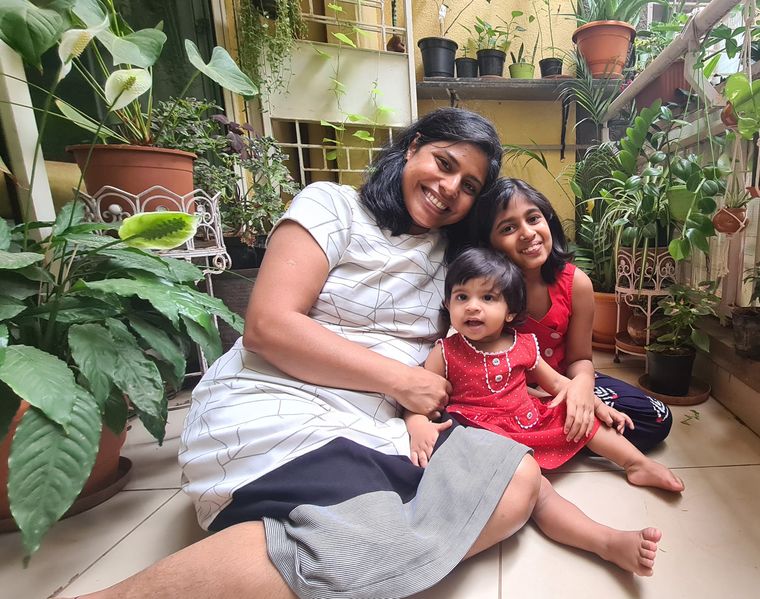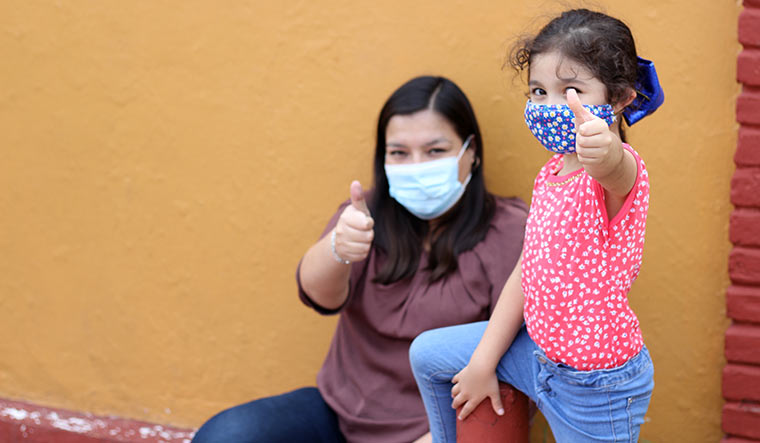Pratha Narang Naik’s world turned upside down after her six-month-old daughter Tara tested positive for Covid-19 on December 28.
Tara had high fever. “I gave her Calpol. The fever wasn’t coming down yet and she was very lethargic. We thought it was dengue and took her to hospital. By then, her oxygen levels had dropped to 88,” said Naik, a travel photographer based in Mumbai.
Tara was the first one to have Covid in the family. “I was absolutely clueless. I don’t know how she got Covid. We barely stepped out of our home those days, and until then we were told children don’t get Covid,” she said.
Omicron is spreading like wildfire in India and children are increasingly getting infected. “When I reached the ICU, there were only two or three kids, infected with Covid-19. All beds were empty. By the time we got discharged on January 3, there were two more Covid wards for children. One of the babies admitted to the Covid ward was just 26-days-old,’’ said Naik, who also got infected while in the ICU with Tara.
The fear of reinfection has made Naik and her family move to Pune. “We don’t know how long the antibodies stay for. Also, many in Mumbai are testing positive at home and are not reporting it to the health department. If my neighbour has Covid, I won’t know. Half the people who test positive for Covid at home are roaming around. I didn’t want my baby to get reinfected with Covid. So we have moved into a villa in Pune,” she said.
The third wave is hitting children hard. Between June 2020 and February 2021, children made up to 2.72 per cent to 3.59 per cent of the total Covid caseload in the country. Now they account for 7 per cent of cases in the country, said Dr Harish Chafle, senior consultant, pulmonology and critical care at Global Hospital, Parel, Mumbai. In the city, a large number of children in orphanages and children’s homes have got affected during the third wave. The test positivity rate among children in Bengaluru in the age group of 0-9 years has climbed to 9.5 per cent during the third wave.
Body ache, headache, throat pain, mild cough and cold with high grade fever are symptoms commonly seen in children in the third wave. “The difference between the second wave and third wave in my experience is that the fever is high grade now. It literally disappears after the third day. And then the child is completely normal,” said Dr Supraja Chandrasekhar, consultant paediatric intensivist at Manipal Hospital, Yeshwanthpur, Bengaluru.
When the Omicron led third wave peaks in India (some said around February 3), 12-14 year olds and those under 12 will continue to remain unvaccinated, for vaccinations for the 12-14 age group in the country will begin by February end or early March. This has been a major cause for concern.
It remains to be seen what share of 15-17 year olds will get vaccinated and develop immunity by the time the third wave peaks. This is an age group that is particularly vulnerable. Campus outbreaks make them more prone to the infection. Also, children tend to socialise frequently, flouting pandemic rules.
India started its vaccination drive for teenagers aged between 15 and 18 on January 3. Over 3.3 crore teenagers have received their first dose of the Covid 19 vaccine, which means we are nearly halfway through. There are around 7.4 children in the country in the age group of 15-17. The government aims to vaccinate the rest of them by January end.
A significant portion of children in India seem to have the redeeming feature of antibodies. At Manipal Hospital, Yeshwanthpur, any febrile child (having or showing symptoms of fever) is asked to get a Covid antibody test done. The data show that 70 per cent of the children who got admitted in the last six months had already developed antibodies to Covid 19. In most cases, parents were unaware that the child had Covid, said Chandrasekhar. “More than 70-75 per cent of children in India have developed Covid antibodies. They would have got exposed and not even known,” she said.
Can babies get Covid?
Studies show that Covid worsens maternal and foetal outcomes. “When the pandemic started, one of our concerns was could Covid actually be transmitted to the baby when inside the uterus? We hardly had any data on this. We had very little information on how Covid would affect the baby when the baby was born. However, we now have two years of data which by and large indicates that newborns are not affected, in the sense that the infection is not passed on to them,’’ said Dr Prathimas Reddy, director and lead consultant, department of obstetrics and gynaecology, Sparsh Hospital for Women and Children, Bengaluru. That said, there are three scenarios that we need to take into consideration, she said. “One, there are a small number of babies who can become infected with Covid in the womb itself. Two, there are chances of the newborns catching the infection after delivery because the mother is already infected. Additionally, in the last year we noticed that many newborns had a multi-system involvement (that can affect vital organs like the heart, lungs and kidneys) wherein they would become quite sick. When we looked into it, we found that Covid had actually given rise to the multi-system involvement in the newborn babies.”
Since there are no Covid-19 vaccines for newborns as of now, the treatment currently is to stabilise the newborn with supportive treatment, said Reddy.
What to do if your child gets sick with Covid-19?
High grade fever is common among children with Covid-19 and sometimes it is the only symptom. While caring for such children, it is important to do frequent temperature checks and control fever with paracetamol. Also children, especially infants, tend to get dehydrated quickly, so they must be made to sip liquids frequently.
Children with Covid don’t require any fancy medications, said experts. “They don’t require antibiotics, antivirals or antibody cocktails. They are not authorised or licensed for children,” said Chandrasekhar. The current protocol being followed is in line with the national guidelines issued during the second wave.
Sometimes children who test positive for Covid-19 are taken to general physicians who give them blanket treatment meant for adults. It is harmful. “They do beautifully well with home monitoring. Check breathing rate, temperature, saturation, and pulse rate. If fever persists for more than three days, they would require physical consultation,’’ said Chandrasekhar.
Lingering complications
If your child has fever along with signs and symptoms like rashes, joint pains, breathing difficulty, diarrhoea, stomach pain, eyes congestion, a few weeks after getting infected with Covid-19, do not hesitate to seek help.
Multi-system inflammatory syndrome (MIS) is seen in children, post-Covid, after three to six weeks, said Dr Himanshu Batra, consultant—paediatrics, HCMCT Manipal Hospitals, Delhi, “It is a serious condition that requires prompt diagnosis and management to prevent long-term complications.’’
Blood reports of children with MIS suggest increased levels of inflammatory markers and presence of anti-Covid antibodies. “Once diagnosis of MIS is suspected on basis of above symptoms and reports, 2D echo is done to assess heart involvement and management is aimed at controlling inflammation with steroids and immunity modulator like intravenous immunoglobulins,’’ said Batra.
When Covid fear lurks…
When Ruchi Dwivedi from Bengaluru tested positive for Covid-19 two weeks ago, she was concerned that she might pass it on to her children. “Adults at home were vaccinated so had some amount of protection but kids were not. Kids of my friends and families who were infected had shown much strong symptoms like high fever, vomiting, loose motions and this further worried me,’’ said Dwivedi, “Shreya, my younger daughter, is just one-and-a-half-years old, and can't even express her discomfort so we had to be very careful.’’
A hands-on mom, Dwivedi found it hard to ignore her daughter's calls during bedtime. “Shreya would come knocking at my door, calling 'mamma' in her sweet, innocent voice,’’ she said. Dwivedi’s mother-in-law and husband took care of the children and kept them engaged while she was in isolation. “Technology came in handy as when they were too upset, video calls with family and friends were made and that helped a lot,’’ said Dwivedi.
Parents and grandparents can do a lot to support their children through the pandemic and make life easier for them. The Covid fear has taken a toll on the mental health of children. This is further compounded by lack of social interaction and physical schooling.
Said Dr Veena Raghunathan, senior consultant, paediatric critical care, Medanta, the Medicity Hospital, Gurugram, “Children should be reassured that this is not permanent, and the situation will improve. With increasing vaccination coverage, we are sure to see light at the end of the tunnel.’’
If your children are eligible for vaccination, do not hesitate to get them vaccinated, said Raghunathan. “There is increasing evidence to show that vaccination decreases the severity of Covid. Vaccination of children is going to be a major step in halting the progress of this pandemice,” she said.
Keep smiling, no matter what
Your state of mind is your child’s state of mind. If your child gets infected, don’t panic. Like Naik, who made sure her baby had a good time in the ICU. Tara’s routine had got disrupted while she was in the hospital. She looked uncomfortable as she was surrounded by cries of pain and distress. Naik, however, did all she could to make her feel better. She got her toys. “If you get scared, your child will also get scared. They mirror your feelings and emotions,’’ said Naik, who was amused to see Covid positive kids in the ward making friends with each other.
“You’ve to be sane to keep your child sane. If you keep your face glowing for your kid, it will make your kid feel a lot better,’’ she said.
Naik returned from the hospital as a changed woman. "I value life more now,” she said.




